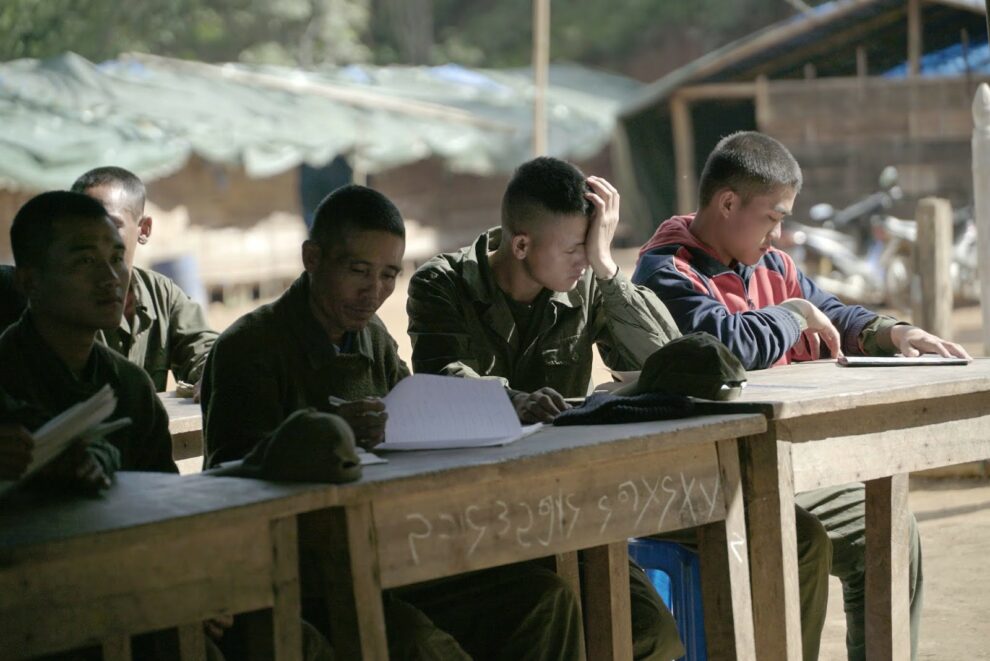by Hugo Hamon
“Soil without land” is an intense dive into the harsh life of a young Shan, forced to join a guerrilla war in the heart of the Burmese jungle. This rich and intense documentary also provides keys to understanding his latest feature film presented at the Busan International Film Festival, “Doi Boy” (2023).
Without denying its compassion for its main character, “Soil Without Land” avoids all the pitfalls, and offers an ethical, uncompromising look at the complexity of individual and collective destinies caught up in the intricacies of reality.
Jai Sang Lod, a young stateless Shan man, recalls his family's flight from the fighting between the Burmese army and the Shan minority in 2001. Having narrowly escaped the war, he is now compelled to join the Shan State Army for his mandatory military service, returning to a life of conflict and violence. This is an opportunity for Nontawat Numbenchapol to delve into the heart of the Shan State Army, an insurgent guerrilla group.
As a child, Jai Sang Lod, with his family and many other Shan families sought refuge in a village governed by the Shan State Army (SSA), located between the borders of Burma and Northern Thailand. Stuck there without any lD or passport, Sang Lod is being compelled by the SSA to undergo mandatory military training for all young men. Leaving his family behind, his everyday life now consists of grueling physical training. Alongside hundreds of other uniformed young men, under the burning sun and lectures on manhood and patriotism, he trains to become a soldier with a lifetime duty to fight for Shan sovereignty and liberation from the Burmese military.
The director captures a crucial moment in this young man's life : after the recent loss of his mother, he must leave his younger siblings behind and enter the military profession. The identity struggles of Jai Sang Lod serve as a magnifying glass for the implacable logic that governs the destiny of thousands of young people. Jai Sang Lod himself seems to float, caught between sleep and wakefulness, in a blurred mental space. In the end, he becomes the defender of the system that is crushing him and of an identity he has not chosen. As well as delving into the particular situation of the Shan State Army, Nontawat Numbenchapol delivers a film about the search for identity, emancipation, the desire for recognition and military recruitment.
For more than 50 years, a civil war has been raging between the Shan – the largest ethnic minority group in Burma – and the Burmese military. As Myanmar transitions from military to democratic rule and Thailand shifts from democracy to military rule, the future of the Shan people and other minorities in the region remains uncertain, with continued violence and displacement.
In the introductory card, Nontawat Numbenchapol objectively explains that the regime is a military dictatorship. He acknowledges that his lack of military experience limits his perspective. The filmmaker's use of the documentary as a tool for prospective analysis is rigorous and scientific. “Soil Without Land” does not take sides, either for or against the Shan, but rather reveals the harshness of conscription, the fate of deserters, and the training of bodies in a complex and off-the-wall context.
Through both its subject matter and its form, the documentary highlights the marginalized existence of certain populations. The first shot of the film is a drone shot over a ridge road winding through steep territory, where the Shan State Army is hiding. This aerial shot questions the boundaries of national space as represented by Burmese authorities and international bodies, highlighting the hidden ghost nations in the forest that are missing from the maps. The director uses marginal spaces to evoke the relationship between knowledge of the territory, the logic of power, and the national imaginary. The questioning of the geo-body is directly evoked by the title: a “soil” that is not yet a “land”, a “stateless territory”. The uniforms, synchronized movements, rigid bodies, clear objectives and shared songs are an attempt to form a nation.
The film's spiritual sequel, “Doi Boy” also explores the theme of identity in a marginalized and unregulated context. In “Soil Without Land”, there is a scene where the characters express a desire to escape to Thailand, despite the risks of facing illegality, exploitation, and prostitution. This topic will be explored in “Doi Boy”
All in all, “Soil without Land” is an intense documentary that plunges into the heart of the violence of guerrilla warfare in the jungles of Myanmar. In so doing, it offers a broader reflection on the issues of the ghost nation, coercion, and, ultimately, national territory. It's a rich, intense movie that never stops at simple recording, but opens up the whole philosophy of documentary. Indeed, The film presents very little factual information to help us understand the history or geopolitical issues of SSA, but chooses to let the images and the subjective point of view effectively reach a greater truth. The sensitive experience of a person and a documentary filmmaker reveals the deep underlying discourses that determine any experience of reality. A film that leaves no one indifferent.
















